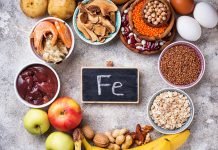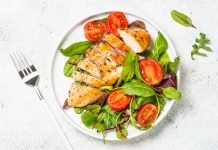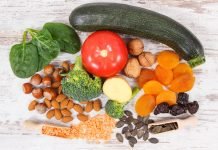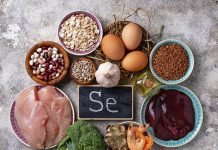Iodine
Most of the world’s iodine is found in the ocean, where it is concentrated by sea life, especially seaweed.
It is specifically found in many sea vegetables such as sea kelp and seaweed but iodine is also found in seafood such as cod, shrimp and tuna (1). Iodine can also be found in certain dairy products such as yoghurt and cheese, lima beans, bananas, prunes and eggs.
“Iodine helps make thyroid hormones, which help keep cells and the metabolic rate – the speed at which chemical reactions take place in the body – healthy”, says the UK National Health Service. (2)
According to Medline Plus: “Iodine deficiency and the resulting low levels of thyroid hormone can cause women to stop ovulating, leading to infertility”. (3)
Health Benefits of Iodine
- It may improve performance
- Supports the nervous system
- Healthy looking skin
- Metabolic management
- Thyroid function and hormone production
- Thyroid and Weight Loss
What are the Benefits?
1) It may help improve performance
Iodine contributes to normal energy-yielding metabolism, which may help in cases of tiredness and fatigue. This may also help those wanting to maximise their performance.
2) Supports the nervous system
According to Medline Plus:
“Iodine plays an important role in the development of the central nervous system. In extreme cases, iodine deficiency can lead to cretinism, a disorder that involves severely stunted physical and mental growth.” (3)
3) Healthy looking skin
Iodine helps to maintain healthy skin. This may be helpful for skin problems such as acne, eczema and psoriasis, as a deficiency may lead to poor maintenance of normal skin.
4) Metabolic management
Every cell in the body depends upon thyroid hormones (4). Iodine influences thyroid glands by helping with the production of hormones that are responsible for controlling the body’s basal metabolic rate, which ensures that the body’s organ systems and biochemical processes are working efficiently, including growth and development but also regulating metabolism. (5)
5) Thyroid function and hormone production
Thyroid hormones regulate many important biochemical reactions, including protein synthesis and enzymatic activity, and are critical determinants of metabolic activity. (6)
As explained by EndocrineWeb,
“The function of the thyroid gland is to take iodine, found in many foods, and convert it into thyroid hormones: thyroxine (T4) and triiodothyronine (T3). Thyroid cells are the only cells in the body which can absorb iodine. These cells combine iodine and the amino acid tyrosine to make T3 and T4. T3 and T4 are then released into the bloodstream and are transported throughout the body where they control metabolism (conversion of oxygen and calories to energy).” (7)
According to WebMD,
“Taking iodine by mouth can improve thyroid storm and hyperthyroidism. Also, taking iodized salt in addition to thyroxine after surgery for thyroid disease appears to reduce the size of the thyroid.” (8)
6) Thyroid and Weight Loss
The British Thyroid Foundation explain more on thyroid hormone and how it can be used to help you lose weight: (9)
“Thyroid hormones have been used as a weight loss tool in the past. Many studies have shown that excess thyroid hormone treatment can help produce more weight loss than can be achieved by dieting alone. However, once the excess thyroid hormone is stopped, the excess weight loss is usually regained.”
Recommended Daily Intake
Although ensuring you are receiving the right amount of iodine from food sources is always preferred. According to the British Thyroid Foundation, The World Health Organisation recommendations are as follows:(10)
- Children 0-5 years: 90 μg/day
- Children 6-12 years: 120 μg/day
- Adults (and those over 12 years): 150 μg/day
- Pregnant women: 250 μg/day
- Women who are breastfeeding: 250 μg/day
National Institutes of Health, Office of Dietary Supplements provide the Recommended Dietary Allowances (RDAs) for Iodine as shown in the following table (11):
| Age | Male | Female | Pregnancy | Lactation |
|---|---|---|---|---|
| Birth to 6 months | 110 mcg* | 110 mcg* | ||
| 7–12 months | 130 mcg* | 130 mcg* | ||
| 1–3 years | 90 mcg | 90 mcg | ||
| 4–8 years | 90 mcg | 90 mcg | ||
| 9–13 years | 120 mcg | 120 mcg | ||
| 14–18 years | 150 mcg | 150 mcg | 220 mcg | 290 mcg |
| 19+ years | 150 mcg | 150 mcg | 220 mcg | 290 mcg |
* Adequate Intake (AI)
Food Sources of Iodine and the amount of Iodine per service:
| Food | Approximate Micrograms (mcg) per serving |
Percent DV* |
|---|---|---|
| Seaweed, whole or sheet, 1 g | 16 to 2,984 | 11% to 1,989% |
| Cod, baked, 3 ounces | 99 | 66% |
| Yogurt, plain, low-fat, 1 cup | 75 | 50% |
| Iodized salt, 1.5 g (approx. 1/4 teaspoon) | 71 | 47% |
| Milk, reduced fat, 1 cup | 56 | 37% |
| Fish sticks, 3 ounces | 54 | 36% |
| Bread, white, enriched, 2 slices | 45 | 30% |
| Fruit cocktail in heavy syrup, canned, 1/2 cup | 42 | 28% |
| Shrimp, 3 ounces | 35 | 23% |
| Ice cream, chocolate, 1/2 cup | 30 | 20% |
| Macaroni, enriched, boiled, 1 cup | 27 | 18% |
| Egg, 1 large | 24 | 16% |
| Tuna, canned in oil, drained, 3 ounces | 17 | 11% |
| Corn, cream style, canned, 1/2 cup | 14 | 9% |
| Prunes, dried, 5 prunes | 13 | 9% |
| Cheese, cheddar, 1 ounce | 12 | 8% |
| Raisin bran cereal, 1 cup | 11 | 7% |
| Lima beans, mature, boiled, 1/2 cup | 8 | 5% |
| Apple juice, 1 cup | 7 | 5% |
| Green peas, frozen, boiled, 1/2 cup | 3 | 2% |
| Banana, 1 medium | 3 | 2% |
*DV = Daily Value. DVs were developed by the U.S. Food and Drug Administration (FDA) to help consumers compare the nutrient contents of products within the context of a total diet.
Iodine synergy and works well with
- Vitamin B Complex for fatigue and tiredness as B vitamins contribute to energy-yielding metabolism.
- Evening Primrose Oil for healthy skin, hair and nails
- Green Tea – for slimming by increasing metabolic rate
Some things to consider
Excess Iodine is not absorbed, so you can’t overdose on it.
It should not be taken if you are on thyroid medication such as thyroxine. This also applies to supplements containing it, which includes many multivitamins and weightloss products.
Resources
Last accessed online 23/06/2020
- https://www.healthline.com/nutrition/iodine-rich-foods
- https://www.nhs.uk/conditions/vitamins-and-minerals/iodine/
- https://medlineplus.gov/ency/article/002421.htm
- https://www.endocrineweb.com/conditions/thyroid/how-your-thyroid-works
- https://www.ncbi.nlm.nih.gov/pmc/articles/PMC4044302/
- https://magnascent.com/what-is-iodine
- https://www.endocrineweb.com/conditions/thyroid/how-your-thyroid-works
- https://www.webmd.com/vitamins/ai/ingredientmono-35/iodine
- https://www.btf-thyroid.org/thyroid-and-weight-the-science
- https://www.btf-thyroid.org/projects/iodine/249-iodine-faq
- https://ods.od.nih.gov/factsheets/Iodine-HealthProfessional/







